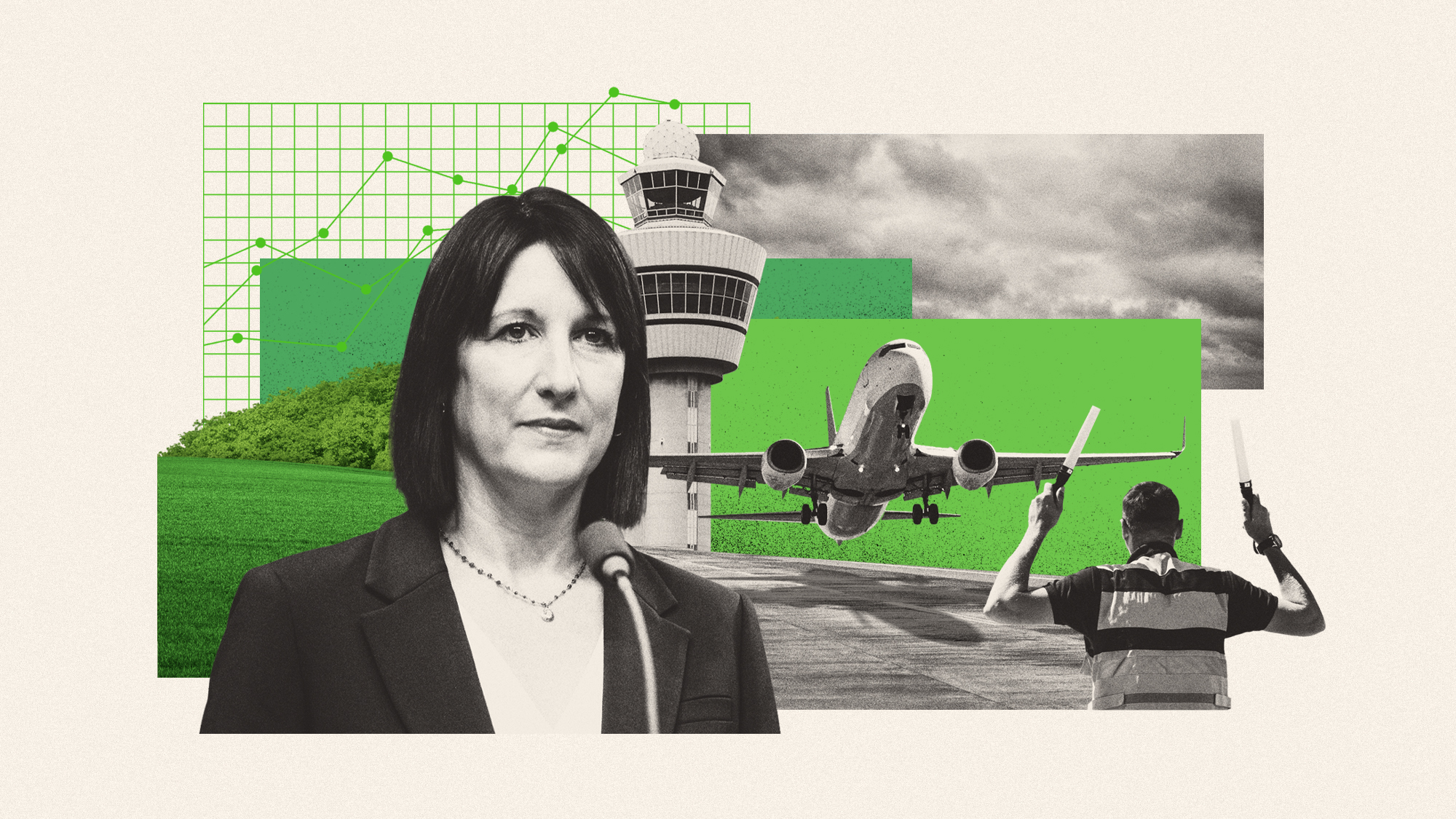Can Nigel Farage and Reform balance the books?
Mr Brexit has, for the first time, ‘articulated something resembling a fiscal rule’ that he hopes will win over voters and the markets

A free daily email with the biggest news stories of the day – and the best features from TheWeek.com
You are now subscribed
Your newsletter sign-up was successful
Nigel Farage today sought to position Reform UK as the “party of alarm clock Britain” championing both business and workers.
In a speech in the City of London this morning, the former stockbroker said the country was being “led by human rights lawyers, not entrepreneurs”, and blamed a “political class who are not business people” of wasting the “opportunities to deregulate and become more competitive” offered by Brexit.
Promising to balance the budget, and that the party would “never borrow to spend” if it came to power, “marks the first time Reform has articulated something resembling a fiscal rule”, said the Financial Times. It also raises serious “questions over the spending cuts or tax increases needed to achieve this goal, as well as the precise definition of the pledge itself”.
The Week
Escape your echo chamber. Get the facts behind the news, plus analysis from multiple perspectives.

Sign up for The Week's Free Newsletters
From our morning news briefing to a weekly Good News Newsletter, get the best of The Week delivered directly to your inbox.
From our morning news briefing to a weekly Good News Newsletter, get the best of The Week delivered directly to your inbox.
What did the commentators say?
This is a “big moment” for Reform, said Matthew Lynn in The Spectator. Headline-grabbing promises made at the last election such as lifting the income tax threshold to £20,000, scrapping inheritance tax on estates of less than £2 million, and taking water companies back into public ownership, are set to be junked.
In their place the “new-look ‘Nigel from Accounts’” is promising “a far more sober approach to the public finances”. But still “don’t be fooled: this doesn’t mean that Reform is abandoning the economic radicalism that the UK desperately needs if it is to break out of its doom loop of stagnant growth and rising taxes”.
One area the party appears willing to challenge the status quo is on the pension triple lock. The policy of raising the UK state pension each year by whichever is highest out of inflation, average earnings or 2.5% has “trapped Britain’s two main parties since 2012 in a bind that, for some, has come to symbolise the paralysis of the state”, said Politico’s Dan Bloom.
While economists have long argued this has become unsustainable, successive governments of both main parties have shied away from touching it in fear of angering older voters.
A free daily email with the biggest news stories of the day – and the best features from TheWeek.com
Reform, by contrast, has been “remarkably open” about whether the triple lock would survive, said Bloom. While any decision appears a “long way off”, when Farage does make up his mind, “he has the power to radically alter the political landscape in the UK – and set a new bar for insurgent parties across Europe telling hard truths that the centre cannot”. But saying that, “he would also come under ferocious attack”.
Another major spending area the party appears ready to start a fight over is reforming public sector pensions to bring them more in line with those offered by companies.
When spending is “under control” and borrowing costs down, said Farage, “then, and only then, will I cut taxes to stimulate growth”.
What next?
There is a belief among Reform insiders that the economy is “only going to worsen before the next election,” said The Times, which will mean the Tories “having to abandon many of their promises to cut taxes”.
Farage may choose to keep his cards close to his chest until then, but he is “at least trying to signal a more traditional coding when it comes to the economy, entering the financial stability battleground on which elections are routinely fought”, said Politico’s London Playbook.
“On that front, the insurgent is straining to sound a little more like the opponents he’s trying to banish”.
Right on cue, Labour last night attacked Reform’s claim to be “on the side of working people, whilst also promising to slash the public services they rely on”, saying Farage’s plan would mark “a return to austerity, pure and simple”.
Meanwhile, Mel Stride, the shadow chancellor, said Farage has committed to “extra welfare spending and a huge expansion of the state”, adding it is “impossible to take Reform seriously on the economy when their promises disintegrate after five minutes”.
Herein lies both the danger and opportunity for Reform as it looks to hone its offering to voters on both the left and the right.
Officials were “understandably chuckling at the opposing attacks from each angle – but there’s a serious point here”, said London Playbook. “Each new bit of detail that Farage fleshes out will give his rivals, and the public, more to unpick him on.”
-
 What to know before filing your own taxes for the first time
What to know before filing your own taxes for the first timethe explainer Tackle this financial milestone with confidence
-
 The biggest box office flops of the 21st century
The biggest box office flops of the 21st centuryin depth Unnecessary remakes and turgid, expensive CGI-fests highlight this list of these most notorious box-office losers
-
 The 10 most infamous abductions in modern history
The 10 most infamous abductions in modern historyin depth The taking of Savannah Guthrie’s mother, Nancy, is the latest in a long string of high-profile kidnappings
-
 Is the UK headed for recession?
Is the UK headed for recession?Today’s Big Question Sluggish growth and rising unemployment are ringing alarm bells for economists
-
 How is AI reshaping the economy?
How is AI reshaping the economy?Today's Big Question Big Tech is now 'propping up the US economy'
-
 Why are Americans using 'buy now, pay later' apps to buy groceries?
Why are Americans using 'buy now, pay later' apps to buy groceries?Today's Big Question A 'layaway program, but reversed'
-
 Who would win in a China-US trade war?
Who would win in a China-US trade war?Today's Big Question Tariff pain will be higher for China but Beijing is betting it can weather the storm
-
 How could stock market slides affect you?
How could stock market slides affect you?Today's Big Question Pensions, prices and jobs at risk as Donald Trump's 'Liberation Day' measures take hold
-
 Are free trade zones and alliances the answer to Trump's tariffs?
Are free trade zones and alliances the answer to Trump's tariffs?Today's Big Question Temptation is to retaliate with trade barriers, but most agree nations should focus on targeted trade pacts and strengthening cooperation
-
 Airport expansion: is Labour choosing growth over the environment?
Airport expansion: is Labour choosing growth over the environment?Today's Big Question Government indicates support for third Heathrow runway and expansion of Gatwick and Luton, despite climate concerns
-
 Will Rachel Reeves have to raise taxes again?
Will Rachel Reeves have to raise taxes again?Today's Big Question Rising gilt yields and higher debt interest sound warning that Chancellor may miss her Budget borrowing targets